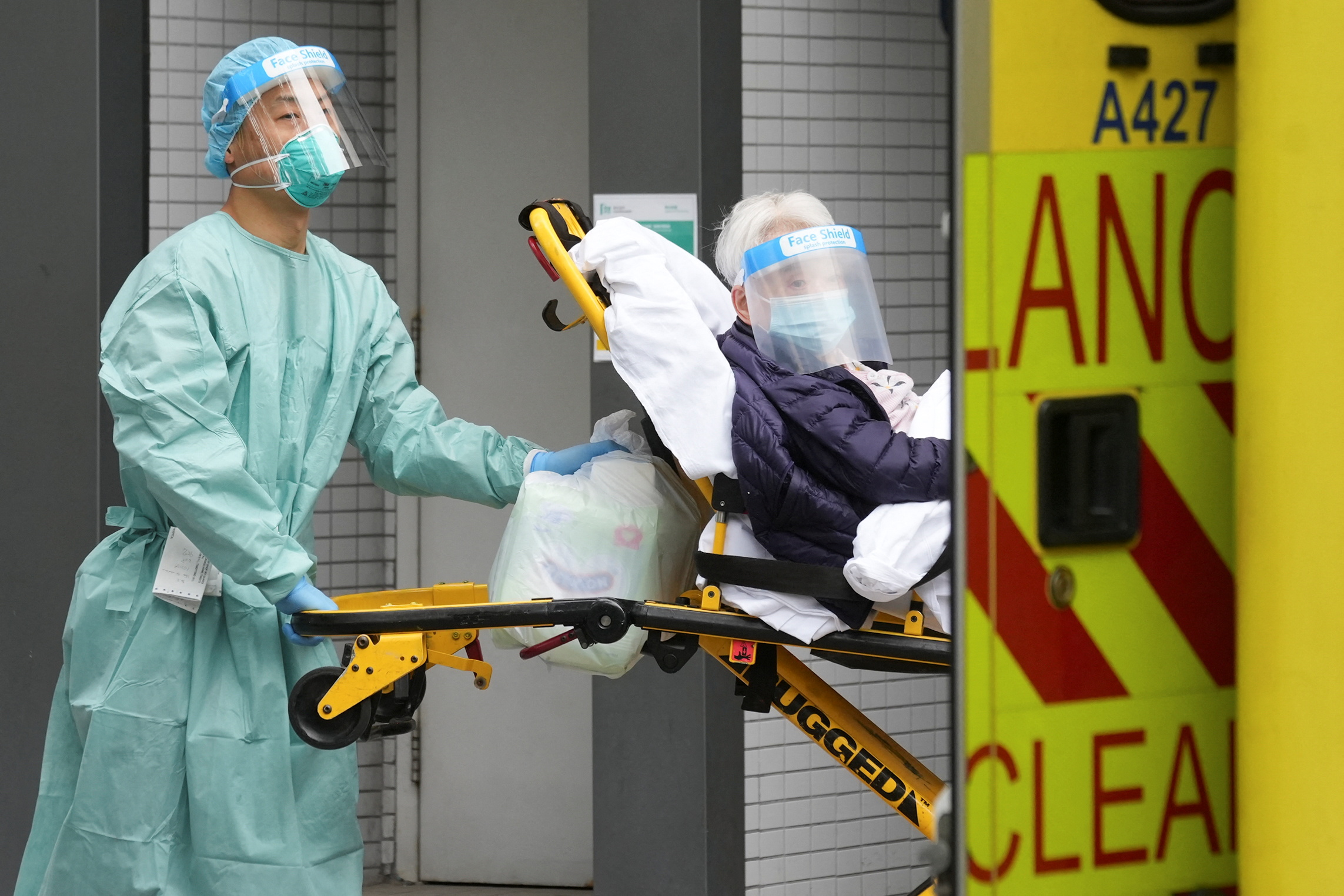Experts predict a wave of Covid-19 deaths among Hong Kong's seniors
Sign up now: Get ST's newsletters delivered to your inbox

Nearly 7,000 people could die during this Covid-19 wave, according to a report from University of Hong Kong researchers.
PHOTO: REUTERS
Follow topic:
HONG KONG (BLOOMBERG) - Deaths in Hong Kong's worst-ever Covid-19 outbreak are forecast to spiral, with experts predicting a wave of fatalities among the city's under-inoculated and vaccine-hesitant elderly population.
Only 43 per cent of seniors who are 80 or over have received one dose, according to government data.
While that is up from 22 per cent in early January, it still is not enough to protect the segment of the population most at risk, according to Dr Karen Grepin, an associate professor at the University of Hong Kong's School of Public Health.
Elderly patients have already made up the majority of the 311 deaths in this outbreak so far.
"Even doubling of a small number is still a small number," Dr Grepin said. "There are still unvaccinated people in nursing homes and that is just a ticking time bomb."
Nearly 7,000 people could die during this wave, according to a report from the university's researchers.
An overwhelming majority of those deaths is likely to be among the elderly. With hospitals overflowing and unable to take in more patients, local nursing home operators are warning of the danger of Covid-19-positive seniors seeding widespread outbreaks.
Facilities do not have the staff, equipment or space to cope with any infected residents, the Elderly Services Association of Hong Kong said in a Feb 18 statement that called on the government to find other places to house the asymptomatic elderly.
Infected people on-site "could lead to an imminent crisis in residential homes", the association said.
The worry is well-founded, given the experience in other countries.
In the United States, Covid-19 fatalities among unvaccinated people 80 and older were nearly seven times higher than for vaccinated seniors in the same age group, the Centres for Disease Control and Prevention said.
Medical conditions
Hong Kong's government launched a vaccination programme in early 2021 but failed to persuade most seniors, who worried about reports of side effects or were complacent from Hong Kong's low incidence of Covid-19 cases.
The government encouraged people with existing medical conditions to consult their doctors first before getting vaccinated, and many risk-averse physicians advised patients to wait.
As the months went by and the elderly vaccination programme stalled, officials urged patience, saying seniors would eventually come round to the idea of getting shots.

During that time, Hong Kong did not make much progress in preparing the additional quarantine facilities, isolation wards or hospital capacity that the elderly would need once Covid-19 pierced the city's defences.
"We were basically buying time to get our most vulnerable sectors of the population vaccinated and we failed to do that," said Dr Grepin.
That is putting the city at greater risk of deaths compared with other places with more successful elderly vaccination programmes.
While the number of cases in South Korea has been soaring, the fatality rate is falling, dropping to just 0.38 per cent on Feb 20 compared with 0.88 per cent a month ago. That is thanks largely to the success in the vaccination effort - among South Koreans 60 and older, 88 per cent have received their third shots.
Adding to the risk in Hong Kong, many seniors getting their first vaccines are choosing less effective shots made by China's Sinovac Biotech rather than the messenger RNA vaccines from Pfizer-BioNTech and Moderna that provide more protection against the Omicron variant.
Even as experts call for a renewed campaign to deliver shots, Chief Executive Carrie Lam's government may divert resources away from vaccination efforts towards implementing the sort of city-wide mass testing that Beijing has used in mainland cities to eliminate cases.
"Of the resources available, you should just go all out for vaccination," said Professor Jean Woo, director of the CUHK Jockey Club Institute of Ageing at the Chinese University of Hong Kong.
Mass testing can even make things worse, she said, by forcing older people to spend hours outdoors while waiting for their turn.
"There is nowhere for them to sit," Prof Woo said. "It's cold. It increases the risk of cross-infection."
The adherence to the zero-Covid-19 goal has pushed the healthcare system to the brink, with Hong Kongers shocked by videos on social media of elderly patients lying on gurneys outdoors while waiting for overstretched hospitals to treat them.
Elderly patients infected with the coronavirus should be getting speedy intervention with therapeutics like remdesivir, a drug that requires an intravenous injection, but the crisis in the hospitals makes that extremely difficult, said Dr Siddharth Sridhar, a clinical assistant professor of microbiology at the University of Hong Kong.
"Where are they going to get it? Who is going to give it to them?" he said, adding that short-staffed hospitals are facing problems finding enough doctors and nurses.

